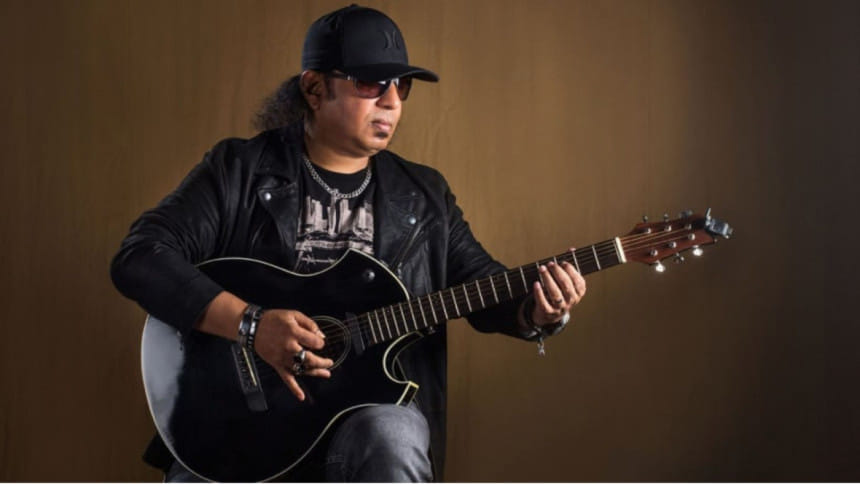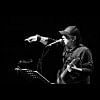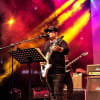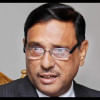Ayub Bachchu’s life, love, and loss in rock music

On October 18, 2018, the news spread like wildfire—the rock legend of Bangladesh, Ayub Bachchu, was no more. As the day progressed, the hospital was flooded with people. Chattogram witnessed a sea of humanity for his final journey. The realm of band music had never seen such profound sorrow in recent memory.
It wasn't just the music world that dimmed; an entire generation's childhood memories of band music faded. The "Guitar Magician" had departed. How would the country's band music scene recover from this loss? How about the legion of music lovers? Everything ended at just fifty-six! If only that day, October 18, 2018, didn't exist on the calendar. Today, he would have turned 62, stepping into his 63rd year.
Born today in 1962, in Chattogram city, Ayub Bachchu came into this world with just fifty-six years in hand. His father wanted a unique name for his son, unlike common names like Ayub Ali or Ayub Hossain. Taking distinct parts from two names, he was christened Ayub Bachchu. From then on, he became "one and only".

Though a cherished son, Ayub didn't have an environment particularly conducive to pursuing music. From childhood, Ayub Bachchu was a bohemian at heart, even while living with his family. His wandering nature seemed untouched by domestic life. He couldn't settle into his father's business or academics. An uncertain future loomed before him.
But if there's a word greater than 'talent' to describe Ayub Bachchu, that would be it. He arrived in Dhaka in 1983 with just Tk600. Staying at a hotel on Elephant Road, he soon rose to become an unrivalled star in Bangladesh's band music scene through sheer talent and hard work. When he sang on stage with his guitar, countless spectators would join in. His guitar riffs sent electric currents through the veins of young fans. To his devotees, he was "Boss". To others, "Sir."
Primarily a rock musician, Ayub Bachchu brought English songs, hard rock, blues, and alternative rock to his audience from the beginning. He maintained the wave of youth enthusiasm for band music. In various interviews, he mentioned Jimmy Hendrix, Joe Satriani, and Steve Moore as his inspirations.
But he wasn't limited to just rock or band music. He also mesmerised listeners with modern songs and folk tunes. He even remade an album of folk songs that received tremendous response from listeners. He sang very few songs for films, but those few became immensely popular.

Yet, behind the smiling, singing Ayub Bachchu was a heart full of sorrow. Perhaps only those very close to him knew. And in song after song, he shared his unexpressed pain with his listeners. His music and singing carried a sense of hurt. As the lines from one of his songs go, "How much more will you make me cry this way, if you make me cry more, I'll fly away into the"sky"—his life seemed to mirror these very words.
According to several lyricists and composers who worked with Ayub Bachchu for a long time and were his friends, he was a very sensitive person. He harboured his hurts internally. Sometimes this was evident in his social media posts. Occasionally, he cried. Ayub Bachchu was like a child at heart.
The man busy with songs and guitar was completely broken by his mother's death, just like any other person. His mother passed away after a long illness. When his mother's body was taken out of their Paltan house to be taken to the local mosque for the funeral prayer and then to Chattogram, Ayub Bachchu went to his mother's empty room. He threw himself on his mother's bed and began to cry loudly. His mother's passing was the biggest sorrow for the rock legend. At various times, he said he would have been happy if he could have gone before his mother. In his words, "It would have been better if I could have gone before my mother... I can't bear what my mother could have."
While bands forming and breaking up is a common occurrence in the music world across all eras and countries, it deeply hurt Ayub Bachchu. This generation mostly knows Ayub Bachchu as the leader of the LRB band. But before LRB, he had to leave several other bands repeatedly. Just before LRB, he was in the Souls band. He left this band too, eventually quitting with a heavy heart.
On April 5, 1990, Ayub Bachchu established his own band, which he named Little River Band. Later, its name was changed to Love Runs Blind (LRB). That same year, LRB started its journey with a double album, which was the first double album in Bangladesh's history. Several songs from these albums became very popular and still resonate in our ears today.
Just as he had been involved with various bands at different times, after forming LRB, he built it like a family. He would say, "This is my other family." But even from this band, several members left at various times. Some members who left the band went abroad. The departure of keyboardist SI Tutul from the band emotionally hurt Ayub Bachchu. After Tutul, he never took another keyboardist in the LRB band.
Above all, Ayub Bachchu was a guitar magician. The twang of the guitar seemed to permeate his entire being constantly. Ayub Bachchu always said, "Guitar is my first and last love. I left home for the guitar." He had a passion for collecting guitars from all renowned brands. Whenever he went abroad, he would visit famous guitar shops. He would play and buy.
He would engage in daily adda (hangouts) with fans, friends, and artistes, sharing these experiences. Yet, sadly, towards the end of his life, he wanted to sell his guitars out of frustration and hurt. He himself wrote in a Facebook status explaining the reason, "I had a great desire to organise a nationwide guitar competition with my guitars, where winners would win one of my beloved guitars by playing these guitars! But even after trying for quite some time, I couldn't find any sponsors..."
Ayub Bachchu wrote, "Maintaining the guitars is quite difficult. So I have decided to sell five guitars initially to those who play guitar or want to keep my guitars in preservation..."
The musician celebrated his last birthday on August 16, 2018. It was a homely arrangement, but filled with genuine love from close ones. On this day, he said, "I want to make some songs that I've never done before. I will write, compose, and sing these songs myself." Two months later, Ayub Bachchu bid farewell suddenly.
This regret will remain forever for his fans. But many songs sung and composed by Ayub Bachchu will endure for a long time, just like his enduring legacy in the music scene of Bangladesh.

 For all latest news, follow The Daily Star's Google News channel.
For all latest news, follow The Daily Star's Google News channel. 












Comments